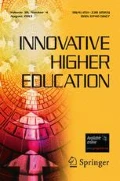Abstract
This five-year study of the peer-led team learning (PLTL) paradigm examined its implementation in a Calculus I course at an all-male HBCU institution. For this study we set up a strong control group and measured the effect of PLTL in the teaching and learning of Calculus I through two points of measure: retention and success rates and learning gains. Our analysis reveals those aspects that can make the implementation of PLTL in calculus and perhaps in mathematics in general challenging and also shows hopeful aspects that promote better learning of the subject.
Similar content being viewed by others
References
Alger, T. D., & Bahi, S. (2004). An experiment in improving scores on ACS course-specific examinations at Southern Utah University. Progressions: Peer-Led Team Learning Workshop Project Newsletter, 5(2), 7–10.
Amaral, K. E., & Vala, M. (2009). What teaching teaches: Mentoring and the performance gains of mentors. Journal of Chemical Education, 86, 630–633.
Brania, A., & Merkel, J. (2010). Calculus I modules: Module 1. Progressions: Peer-Led Team Learning Workshop Project Newsletter, 11(2), 4–13.
Cracolice, M. S., & Deming, J. C. (2001). Peer-led team learning. Science Teacher, 68(1), 20–24.
Gafney, L., & Varma-Nelson, P. (2002). What happens next? A follow-up study of workshop leaders at St. Xavier University. Progressions: The Peer-Led Team Learning Workshop Project Newsletter, 3(2), 1, 8-9.
Gafney, L., & Varma-Nelson, P. (2007). Evaluating peer-led team learning: A study of long-term effects on former workshop peer leaders. Journal of Chemical Education, 84, 535–539.
Gafney, L., & Varma-Nelson, P. (2008). Peer-led team learning: Evaluation, dissemination, and institutionalization of a college level initiative. Dordrecht, The Netherlands: Springer.
Gaston, J. L. (2004). An analysis of a special peer-led team learning mathematics project. Assessment Essentials: A Newsletter of the Gen Ed Assessment Committee, 1(1), 2.
Gosser, D. K. (1999). Project notes. Progressions: The Peer-Led Team Learning Workshop Project Newsletter, 1(2), 14.
Gosser, D. K., Cracolice, M. S., Kampmeier, J. A., Roth, V., Strozak, V. S., & Varma-Nelson, P. (2001). Peer-led team learning: A guidebook. Upper Saddle River, NJ: Prentice Hall.
Gosser, D. K., Kampmeier, J. A., & Varma-Nelson, P. (2010). Peer-led team learning: 2008 James Flack Norris award address. Journal of Chemical Education, 87, 374–380.
Micari, M., Streitwieser, B., & Light, G. (2006). Undergraduates leading undergraduates: Peer facilitation in a science workshop program. Innovative Higher Education, 30, 269–288.
Peteroy-Kelly, M. A. (2007). A discussion group program enhances the conceptual reasoning skills of students enrolled in a large lecture-format introductory biology course. Journal of Microbiology & Biology Education, 8, 13–21.
Quitadamo, I. J., Brahler, C. J., & Crouch, G. J. (2009). Peer-led team learning: A prospective method for increasing critical thinking in undergraduate science courses. Science Educator, 18(1), 29–39.
Roth, V., Cracolice, M. S., Goldstein, E., & Snyder, V. (2001). Chapter four: Workshop leader training. In D. K. Gosser, M. S. Cracolice, J. A. Kampmeier, V. Roth, V. S. Strozak, & P. Varma-Nelson (Eds.), Peer-led team learning: A guidebook (pp. 35–60). Upper Saddle River, NJ: Prentice Hall.
Sarquis, J. L., Dixon, L. J., Gosser, D. K., Kampmeier, J. A., Roth, V., Strozak, V. S., & Varma-Nelson, P. (2001). The workshop project: Peer-led team learning in chemistry. In J. E. Miller, J. E. Groccia, & M. Miller (Eds.), Student-assisted teaching: A guide to faculty-student teamwork (pp. 150–155). Bolton, MA: Anker.
Stewart-Gardiner, C. (2010). Using peer led team learning to assist in retention in computer science classes. Journal of Computing Sciences in Colleges, 25, 164–171.
Tenney, A., & Houck, B. (2003). Peer-led team learning in introductory biology and chemistry courses: A parallel approach. The Journal of Mathematics and Science: Collaborative Explorations, 6, 11–20.
Tenney, A., & Houck, B. (2004). Learning about leadership: Team learning’s effect on peer leaders. Journal of College Science Teaching, 33, 25–29.
Tien, L. T., Roth, V., & Kampmeier, J. A. (2002). Implementation of a peer-led team learning instructional approach in an undergraduate organic chemistry course. Journal of Research in Science Teaching, 39, 606–632.
Varma-Nelson, P., Cracolice, M., & Gosser, D. (2004). Peer-led team learning: A student-faculty partnership for transforming the learning environment. In S. Cunningham & Y. S. George (Eds.), Invention and impact: Building excellence in undergraduate science, technology, engineering, and mathematics (STEM) education (pp. 43–48). Washington, DC: American Association for the Advancement of Science.
Vygotsky, L.S. (1978). Mind in society: The development of higher psychological processes. (M. Cole, V. John-Steiner, S. Scribner, & E. Souberman, Eds.) (A.R. Luria, M. Lopez-Morillas, & M. Cole [with J. V. Wertsch], Trans.) Cambridge, MA: Harvard University Press. (Original manuscripts [ca. 1930-1934])
Woodward, A., Gosser, D. K., & Weiner, M. (1993). Problem solving workshops in general chemistry. Journal of Chemical Education, 70, 651–652.
Acknowledgment
This implementation of peer-led team learning was supported in part by the NIH through the Minority Biomedical Research Support Research Initiative for Scientific Enhancement Program and by the National Nuclear Security Administration.
Author information
Authors and Affiliations
Corresponding author
Rights and permissions
About this article
Cite this article
Merkel, J.C., Brania, A. Assessment of Peer-Led Team Learning in Calculus I: A Five-year Study. Innov High Educ 40, 415–428 (2015). https://doi.org/10.1007/s10755-015-9322-y
Published:
Issue Date:
DOI: https://doi.org/10.1007/s10755-015-9322-y




